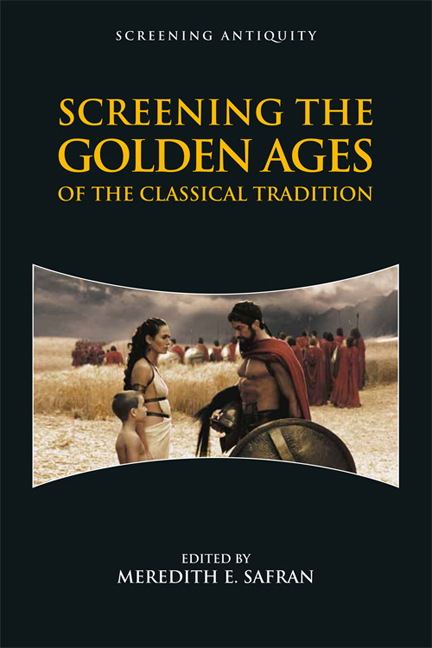Book contents
- Frontmatter
- Contents
- Series Editors’ Preface
- Editor's Acknowledgments
- Contributors
- Illustrations
- Abbreviations
- Introduction: Searching for Gold in an Age of Iron
- PART I THE GLORY THAT WAS GREECE
- 1 Re-(en)gendering Heroism: Reflective Nostalgia for Peplum's Golden Age of Heroes in Hercules: The Legendary Journeys 2.14 (1996)
- 2 Kissed by the Muse of Roller-Disco: Utopia versus the Golden Ages of America, Hollywood, and Classical Myth in Xanadu (1980)
- 3 Gilding American History through Song Culture in O Brother, Where Art Thou? (2000)
- 4 A Leonidas for the Golden Age of Superhero Films: The Thermopylae Tradition in 300 (2006)
- 5 The Dueling Greek Golden Ages of 300: Rise of an Empire (2014)
- 6 Confronting the Ancient Greek Golden Age in Jules Dassin's Phaedra (1962)
- 7 Pericles, Cincinnatus, and Zombies: Classicizing Nostalgia in The Walking Dead (2010–)
- PART II THE GRANDEUR THAT WAS ROME
- Filmography
- Bibliography
- Index
2 - Kissed by the Muse of Roller-Disco: Utopia versus the Golden Ages of America, Hollywood, and Classical Myth in Xanadu (1980)
from PART I - THE GLORY THAT WAS GREECE
Published online by Cambridge University Press: 23 November 2019
- Frontmatter
- Contents
- Series Editors’ Preface
- Editor's Acknowledgments
- Contributors
- Illustrations
- Abbreviations
- Introduction: Searching for Gold in an Age of Iron
- PART I THE GLORY THAT WAS GREECE
- 1 Re-(en)gendering Heroism: Reflective Nostalgia for Peplum's Golden Age of Heroes in Hercules: The Legendary Journeys 2.14 (1996)
- 2 Kissed by the Muse of Roller-Disco: Utopia versus the Golden Ages of America, Hollywood, and Classical Myth in Xanadu (1980)
- 3 Gilding American History through Song Culture in O Brother, Where Art Thou? (2000)
- 4 A Leonidas for the Golden Age of Superhero Films: The Thermopylae Tradition in 300 (2006)
- 5 The Dueling Greek Golden Ages of 300: Rise of an Empire (2014)
- 6 Confronting the Ancient Greek Golden Age in Jules Dassin's Phaedra (1962)
- 7 Pericles, Cincinnatus, and Zombies: Classicizing Nostalgia in The Walking Dead (2010–)
- PART II THE GRANDEUR THAT WAS ROME
- Filmography
- Bibliography
- Index
Summary
In twentieth-century American historiography, the 1970s stand as the nation's iron age, relative to the golden age of post-World War II prosperity. International humiliations in Vietnam and Iran, nationwide outbursts of political violence, the scandal of Watergate followed by President Richard Nixon's resignation, and economic troubles linked to the Mideast oil embargo and the collapse of American manufacturing all congealed into a national sensibility addressed by President Jimmy Carter in his famous “malaise” speech, on July 15, 1979. One escape, especially for socially marginalized groups, was offered by the disco culture developed in underground house parties and clubs. In this utopian atmosphere, DJs and dancers created a world of “communion and ecstasy, fantasy and release,” whose “group body was a polymorphous, polyracial, polysexual mass affirming its bonds in a space beyond the reach of church, state, or family.” Disco exploded into a mainstream cultural juggernaut among white, middle-class Americans through the success of Saturday Night Fever (1977), whose protagonist Tony Manero (John Travolta) became a national icon by transcending his working-class constraints as king of the light-up dance floor at Bay Ridge, Brooklyn's “2001 Odyssey” club.
Industry hopes of capitalizing upon the film's profitability, combined with the youth pastime of roller-disco clubs, encouraged the near-simultaneous production of Skatetown, U.S.A. (1979), Roller Boogie (1979), and Xanadu (1980). These films were set in Venice Beach, a Los Angeles neighborhood founded as a turn-of-the-century amusement park and more recently populated by countercultural California dreamers. All three films, released during the virulent backlash against disco, were commercial and critical disappointments. Yet Xanadu endured as a cult classic, a status eventually mainstreamed by the award-winning 2007 Broadway musical adaptation. Xanadu's appeal is largely owed not to Marc Reid Rubel's original story, about an artist who quit his job painting enlarged album covers as promotional artwork for record stores in order to found a nightclub, but to the vision of producers Lawrence Gordon and Joel Silver. Their overhaul of Rubel's original no-budget comedy subsumed disco's utopian sensibility within the nostalgia generated by the film's new identity as a classic Hollywood musical, which implicated multiple mutually reinforcing modern golden ages.
- Type
- Chapter
- Information
- Screening the Golden Ages of the Classical Tradition , pp. 44 - 64Publisher: Edinburgh University PressPrint publication year: 2018



